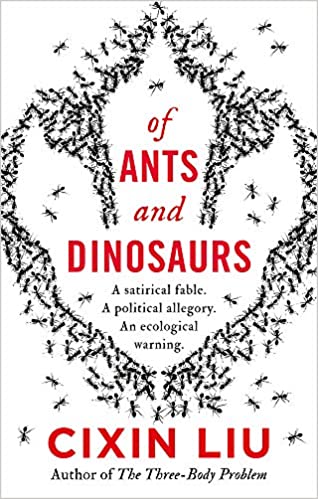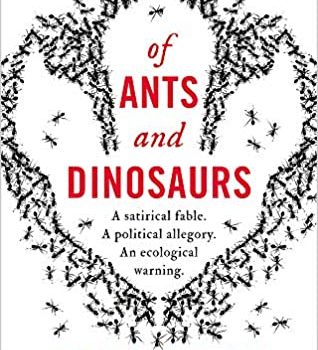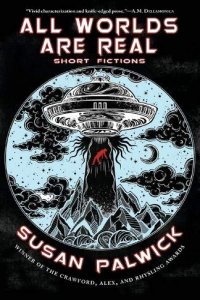Gary K. Wolfe Reviews Of Ants and Dinosaurs by Cixin Liu
 Of Ants and Dinosaurs, Cixin Liu (Head of Zeus 978-1-789-54611-8, 256pp, £18.99, hc) April 2020.
Of Ants and Dinosaurs, Cixin Liu (Head of Zeus 978-1-789-54611-8, 256pp, £18.99, hc) April 2020.
Cixin Liu’s satirical novel Of Ants and Dinosaurs seems to have a complex history. A novella with this title was published in China in 2004, later appearing as a standalone book in 2012, translated by Holger Nahm. This was included in Liu’s 2013 collection The Wandering Earth published in Beijing – but not in the 2016 Head of Zeus version of this title. At some point, Liu seems to have expanded the novella into the full novel now appearing from Head of Zeus in a new translation by Elizabeth Hanlon. For readers familiar with Liu only from his neoclassical hard SF, this rather light and playful piece, largely suitable for younger readers, might come as something of a surprise. It begins as a rather sweet Aesop-like animal fable about ants helping a dinosaur cure a toothache, then turns into a Cretaceous-era parody of the various epochs of historical and technological development (the steam-engine age, the information age, the atomic age, etc.), leading to a rather simplistic recreation of the Cold War and eventually to an ending directly out of Dr. Strangelove, offering a sardonic alternate explanation for the extinction event that ended that era, along with the dinosaurs.
The basic conceit is that, over millions of years, dinosaurs and ants each developed advanced civilizations, but each was constrained by evolution – the dinosaurs because of their lack of manual dexterity with their huge claws and the ants because of their purely programmatic, collectivist intelligence, which precluded creative thought and invention. Following that Aesop-like toothache, though, the two civilizations became symbiotic, with ants providing the organizational ability and capacity for fine detail that enabled them to develop computer technologies and even microsurgery for the dinosaurs, and the dinosaurs providing large-scale technologies such as transportation and architecture. Effectively, the ants provide a version of nanotech for the dinosaurs. While some aspects of the resulting supercivilization follow a kind of ingenious SFnal logic, other parts of the tale lapse into tall-tale mythology, such as the dinosaurs’ 10,000-foot-tall skyscrapers or aircraft the size of gigantic luxury liners. In keeping with Liu’s broad parallels with human history, the first inevitable war between the ants and the dinosaurs results from religious intolerance, while later ones reflect more political and ideological disagreements, and eventually sustainability concerns, as the ants come to realize how quickly the dinosaurs are depleting the Earth’s resources and fouling the environment. When the dinosaurs split into two competing factions, eventually setting up their own version of a cold war complete with mutual assured destruction, it’s tempting to read the collectivist society of the ants, which cooperates with both dinosaur factions, as something like the role played by China in the actual US-Soviet Cold War.
Given its playful tone and enormous scope, Of Ants and Dinosaurs doesn’t leave much room for characterization, and even the handful of generals, diplomats, and scientists who are given names and individual identities are little more than talking viewpoints. In addition to the major ideological conflicts at the center of the tale, Liu finds room for some acerbic comments on matters like labor relations, such as when the ants go on strike, virtually shutting down the dinosaur’s industries. He also has a good deal of fun taking advantage of the vast differences in scale between the ants and the dinosaurs, and he thinks up some ingenious if unlikely ways in which ants might be able to wage military actions against enemies literally millions of times larger than themselves. He’s clearly having fun with the large-scale battle set pieces and the fine details of the ants’ microsurgery techniques, though he struggles to maintain a degree of suspense as the story rumbles toward an ending we all know is inevitable. Still, Liu’s sense of fun is contagious, even if the more didactic warnings seem pretty familiar and the satirical targets hark back to an earlier era for which no one is really nostalgic. For younger readers, though, it might well offer some useful insights into that era and what caused their grandparents to lose so much sleep back in the 1950s.
Gary K. Wolfe is Emeritus Professor of Humanities at Roosevelt University and a reviewer for Locus magazine since 1991. His reviews have been collected in Soundings (BSFA Award 2006; Hugo nominee), Bearings (Hugo nominee 2011), and Sightings (2011), and his Evaporating Genres: Essays on Fantastic Literature (Wesleyan) received the Locus Award in 2012. Earlier books include The Known and the Unknown: The Iconography of Science Fiction (Eaton Award, 1981), Harlan Ellison: The Edge of Forever (with Ellen Weil, 2002), and David Lindsay (1982). For the Library of America, he edited American Science Fiction: Nine Classic Novels of the 1950s in 2012, with a similar set for the 1960s forthcoming. He has received the Pilgrim Award from the Science Fiction Research Association, the Distinguished Scholarship Award from the International Association for the Fantastic in the Arts, and a Special World Fantasy Award for criticism. His 24-lecture series How Great Science Fiction Works appeared from The Great Courses in 2016. He has received six Hugo nominations, two for his reviews collections and four for The Coode Street Podcast, which he has co-hosted with Jonathan Strahan for more than 300 episodes. He lives in Chicago.
This review and more like it in the July 2020 issue of Locus.
 While you are here, please take a moment to support Locus with a one-time or recurring donation. We rely on reader donations to keep the magazine and site going, and would like to keep the site paywall free, but WE NEED YOUR FINANCIAL SUPPORT to continue quality coverage of the science fiction and fantasy field.
While you are here, please take a moment to support Locus with a one-time or recurring donation. We rely on reader donations to keep the magazine and site going, and would like to keep the site paywall free, but WE NEED YOUR FINANCIAL SUPPORT to continue quality coverage of the science fiction and fantasy field.








